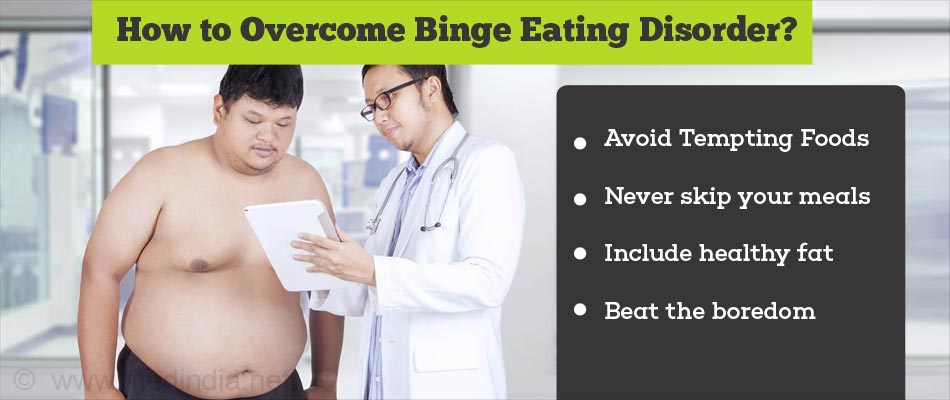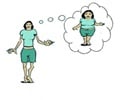- Binge-eating disorder - (http://www.mayoclinic.org/diseases-conditions/binge-eating-disorder/home/ovc-20182926)
- Overview and Statistics - Binge-eating disorder - (https://www.nationaleatingdisorders.org/binge-eating-disorder)
- Symptoms, Treatment, and Help for Compulsive Overeating - (https://www.helpguide.org/articles/eating-disorders/binge-eating-disorder.htm)
Introduction to Binge Eating Disorder
Binge eating is a very serious disorder, which could lead to several life-threatening conditions, that can seriously affect emotional and physical health. According to Research Reports and Reviews, binge eaters are stressed, insomniac, and suicidal. Some of the other problems faced by them are hypertension, hypercholesterolemia, diabetes, cardiovascular diseases, diseases of the gallbladder, liver and kidneys.
According to statistics, one-third women who seek treatment to lose weight suffer from the binge eating disorder (BED). Yet, this is the most common of eating disorders, which is much less recognized than eating disorders like Anorexia and Bulimia.
Therefore, binge eating takes a heavy toll on a person's mind, body and soul.
If you wish to find out if a person suffers from this disorder look for the following signs in a person -
- A voracious appetite; eats very large amounts of food fairly quickly.
- Feels hungry; as quickly as two hours or so after a meal.
- A large appetite and feeling hungry quickly are tendencies out of their control.
- This eating habit has a biweekly frequency and continues for a period of more than six months.
Incidence & Prevalence of Binge Eating Disorder
- BED affects people of all ages and both sexes. It mainly affects women more than men
- It is more common than breast cancer, HIV, and schizophrenia
- Approximately, 28.4% of people with BED are receiving treatment for their disorder
- About, 24 million people are struggling with 'Binge Eating Disorder' in the US
- About 10-15 % of overweight and mildly obese people, who try various fad diets and herbal programs to shed extra weight are binge eaters
What are the Effects of Binge Eating Disorder?
There are many emotional and physical consequences associated with binge eating disorder.
Consequences of Binge Eating:
- Feeling of shame
- Self-hatred
- Anxiety and depression
- Physical discomfort
- Gastrointestinal distress
- Lethargy
- Fatigue
- Loneliness
- Frustration
- Unwanted weight gain
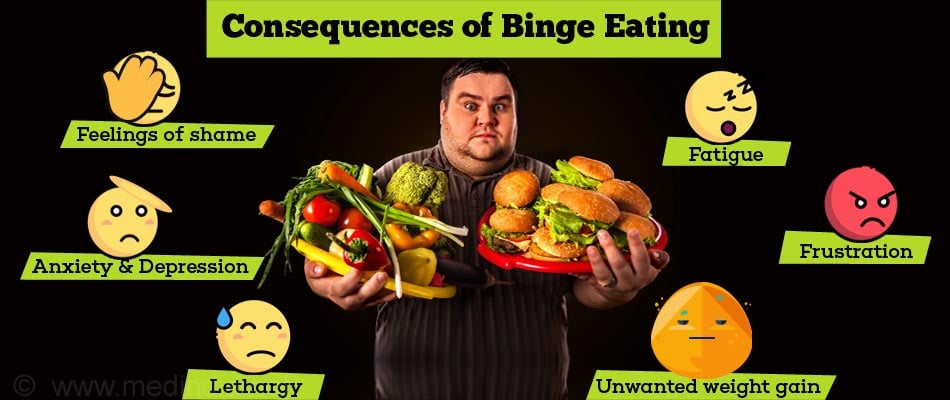
What is the Psychology Behind Binge Eating?
The most common psychological causes of binging are anxiety, stress, and depression.
Normally when a person overeats, they are unable to control their hunger pangs, whereas with an emotional/binge eating session, they are incapable of controlling the emotions.
Rather than finding solace in companionship or material things; they find it in food. They fail to understand that this escapism is not a solution from either their sadness or their emotional imbalance, but a warning of ill-health. It becomes a habit rather than a rare occurrence and slowly becomes a way of life.
What are the Differences Between Overeating, Binge Eating and Bulimia?
Overeating -
Occasional overeating sometimes indicates an inability to choose between healthy and unhealthy food. Good habits, like eating moderate portions of healthy food and eating on a regular schedule are no longer followed. Sometimes, a person overeats on junk food.Emotional Overeating -
Emotional overeating, is when people use food to cope with emotional imbalances, rather than as a means of sustenance, nutrition and energy. Binge Eating Disorder happens when food is used to fill an emotional void resulting in an "addiction" to food. Emotional turmoil is calmed by binge eating although, in the long run, it breeds guilt, shame and disgust.Bulimia - Binge eating disorder resembles a similar disorder called Bulimia Nervosa. However, it differs from bulimia because sufferers do not purge themselves of the excess food by vomiting or by laxative or diuretic abuse.
What are the Causes of Binge Eating?
The causes of binge eating are largely unknown. Eating disorders can be genetic or caused by psychological issues like coping skills, control issues, trauma, family trouble, or social issues.
Often people think that binge eating makes them masters of their moods; on the contrary, it is the reverse, as the moods controlling them. Potent triggers for binge eating are getting overtly hungry, and a feeling of deprivation and sometimes desperation.
Common Binge Eating Causes Include:
Psychological Risk Factors
- Almost half of the binge eaters suffer from depressionDiet Control/ Deprivation -
People who indulge in extreme forms of dieting are more prone to this disorder.Biological Risk Factors
- Biological abnormalities can contribute to binge eating. The metabolism and neurotransmitters involved are being studied.
It is thought that binge eating is caused by poor self-esteem. Binge eating disorder may also be a sequence to bulimia, which often goes unrecognized.
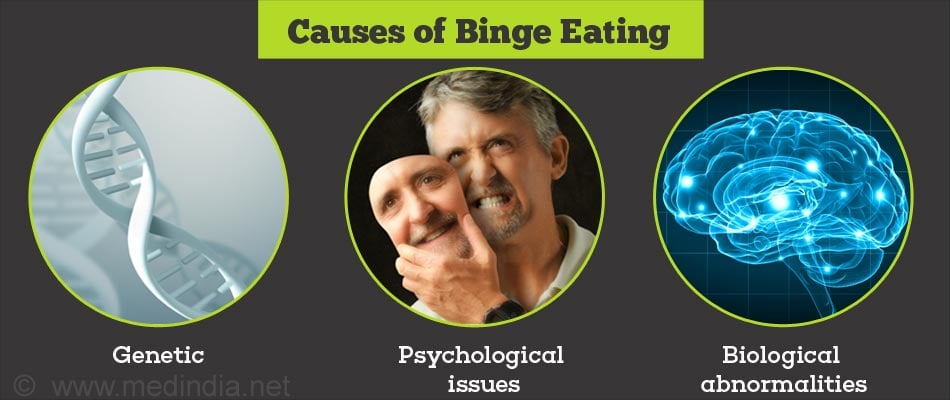
What are the Signs and Symptoms of Binge Eating?
Read the following points and evaluate for yourself, if "you have it in you"! Has the binge eating bug caught up with you? We hope not. If you have experienced some or all of the undermentioned emotions - you require professional help for the disorder.
- Overeating when stressed or in a state of emotional turmoil
- Lingering feeling of disgust or guilt after overeating
- A sub-conscious emotional turmoil, anxiety, loneliness and/or depression
- Occasional pangs of suicidal tendency
- Eating large amounts of food, even when not physically hungry
- Thinking in isolation to keep out of range of 'spying eyes'
- Tendency to diet and lose weight; only to eat and gain weight again
- Feelings of low self-esteem
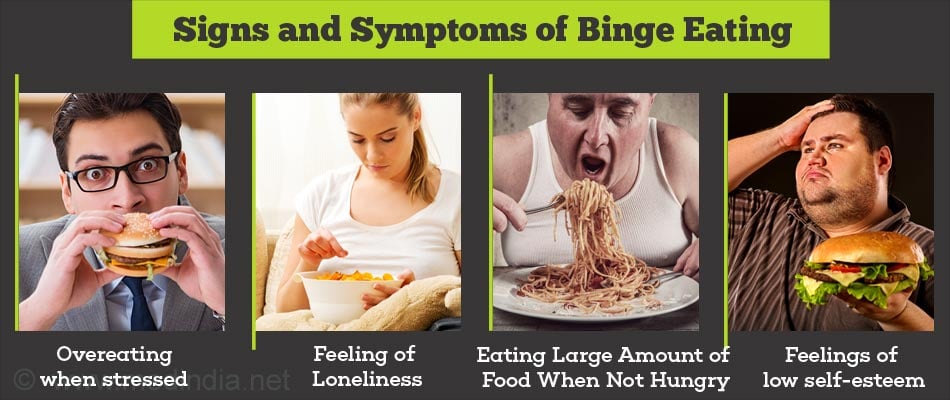
Children and teenagers are known to have large appetites due to the growing demands of their body. This should not be confused with binge eating.
A child qualifies as a binge eater when he/she exhibits the following symptoms:
- Eating food quickly, and in huge amounts
- Eats when exposed to emotional stress
- Eats more and then feels ashamed as to the amount they ate
- Steals and hides food containers in his/her room to eat peacefully
What are the Complications of Binge Eating?
A binge eater has many problems to face. They range from emotional, social, and psychological to the health-related ones. The eating habits significantly affect self-image and social life.
- Abstinence from social gatherings and activities
- Abstinence from work or college, university and school
- Harbors on overpowering sense of helplessness
What are Binge Eating Disorder Treatment & Therapies?
For overeating issues, it is necessary to make important lifestyle changes. Healthy eating is the prima facie of change. Psychological help is also needed.
Health professionals, such as a psychiatrist, psychologist, or clinical social worker can be approached to provide guidance on binge eating disorder. Both physical and psychological aspects are looked into and a behavioral therapy should be advocated. Elevating the victims' self-esteem is the key to treatment.
Some therapies which can be used are as follows:
- Psychological advice - Helps resolve interpersonal issues like relationships with family and friends to help an individual trust the near ones and heal oneself.
- Cognitive behavioral therapy (CBT) - It is a new technique that advocates the use of methods to monitor and change eating behaviours. It teaches how to use other measures and 'self-heal' rather than resort to food every now and then.
- Anti-depression measures - It helps enhance a feeling of happiness and reduce depression. They alleviate sadness and despair. Also, work on the esteem part and let go negative eating patterns.
- Meditation/spiritual elevation - Meditation or speaking out helps people with this disorder. It is like talking or being relaxed when emotional turmoil occurs.

How to Overcome Binge Eating Disorder?
Avoid the temptation - Never stock your kitchen with food that make you overeat like junk food, desserts, and unhealthy snacks. Focus on what you need to eat - Instead of eating mindlessly, be a mindful eater. Slow down and relish the flavor and texture of the food.
Eating regularly - Never skip your meals. Always maintain scheduled meal times and follow a regular meal pattern.
Eat healthy fat - Dietary fat can actually help keep you from overeating and gaining weight. Include healthy fat to keep you feeling full and satisfied.
Beat the boredom - Take a walk, call a friend, read, or take up a hobby such as painting or gardening to distract yourself when you get bored.
